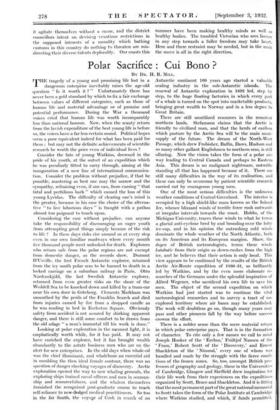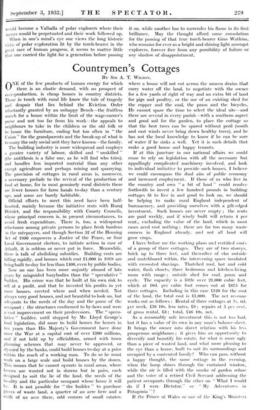Polar Sacrifice : Cui Bono ?
BY DR. H. R. MILL.
THE tragedy of a young and promising life lost in a dangerous enterprise inevitably raises the age-old question " Is it worth it ? " Unfortunately there has never been a gold standard by which to fix a fair exchange between values of different categories, such as those of human life and material advantage or of promise and potential performance. During the War a thousand voices cried that human life was worth incomparably less than national honour. Now, when the scanty return from the lavish expenditure of the best young life is before us, the voices have a far less certain sound. Political hopes seem a poor equivalent indeed for what has been paid for them ; but may not the definite achievements of scientific research be worth the price even of individual lives ?
Consider the fate of young Watkins, drowned in the pride of his youth, at the outset of an expedition which he was peculiarly fitted to carry through, aiming at the inauguration of a new line of international communica- tion. Consider the problem without prejudice, if that be possible; mastering as best one may the sorrow and the sympathy, refraining even, if one can, from cursing " that fatal and perfidious bark " which caused the loss of this young Lyeidas. The difficulty of clearing one's mind is the greater, because in his case the choice of the alterna- tive " to live laborious days " is fraught with a pathos almost too poignant to touch upon.
Considering the case without prejudice, can anyone take the responsibility of discouraging an eager youth from attempting great things simply because of the risk to life ? In these days risks rise around us at every step even in our own familiar roadways where every month five thousand people meet unlooked-for death. Explorers who return safe from the polar regions are not exempt from domestic danger, as the records show. Dumont D'Urville, the first French Antarctic explorer, returned from the icy south polar seas to be burned to death in a locked carriage on a suburban railway in Paris. Otto Nordenskjold, the last Swedish Antarctic explorer, returned from even greater risks on the shore of the Weddell Sea to be knocked down and killed by a tram-car near his own door in Goteborg. Clements Markham was unscathed by the perils of the Franklin Search and died from injuries caused by fire from a dropped candle as he was reading in bed in Eccleston Square. Obviously safety from accident is not assured by shirking apparent danger, and there is still some comfort to be drawn from the old adage " a man's immortal till his work is done."
Looking at polar exploration in the meanest light, it is emphatically worth while, for it has paid. It may not have enriched the explorer, but it has brought wealth abundantly to the astute business men who are on the alert for new enterprises. In the old days when whale-oil was the chief illuminant, and whalebone an essential aid in moulding the then ideal female contour, there was no question of danger checking voyages of discovery. Arctic exploration opened the way to new whaling grounds, the exploring ships trained naval officers and men in seaman- ship and resourcefulness, and the whalers themselves furnished the recognized post-graduate course to teach self-reliance to new-hedged medical practitioners. So too in the far South, the voyage of Cook in search of an Antarctic continent 160 years ago started a valuable sealing industry in the sub-Antarctic islands. The renewal of Antarctic exploration in 1892 led,- step by step, to the huge floating factories in which every part of a whale is turned on the spot into marketable products, bringing great wealth to Norway and in a less degree to Great Britain.
There are' still unutilized resources in the remotest northern lands. Stefansson claims that the Arctic is friendly to civilized man, and that the herds of caribou which pasture by the Arctic Sea will be the main meat- supply of the future. The dream of the North-West Passage, which drew Frobisher, Baffin, Daws, Hudson and so many other gallant Englishmen to northern seas, is still alluring. Now the vision takes the form of a polar air- way leading to Central Canada and perhaps to Eastern Asia. This dream is no malignant nightmare, notwith- standing all that has happened because of it. There are still many difficulties in the way of its realization, and these can only be overcome by patient scientific research carried out by courageous young men.
One of the most serious difficulties is the unknown weather conditions of Central Greenland. The interior is occupied by a high shield-like mass known as the Inland Ice, whence blizzard winds of terrific force rush outwards at irregular intervals towards the coast. Hobbs, of the Michigan University, traces these winds to what he terms a glacial anti-cyclone bred by and brooding over the lofty ice-cap, and in his opinion the outrushing cold winds dominate the whole weather of the North Atlantic, both on its American and its European margins. Shaw, the doyen of British meteorologists, terms these winds katabatic from their origin as down-rushes from the high ice, and he believes that their action is only local. This view appears to be confirmed by the results of the British Arctic Air-Route expedition of 1930-31, so brilliantly led by Watkins, and by the even more elaborate re- searches of the Germans under the splendid inspiration of Alfred Wegener, who sacrificed his own life to save his men. The object of the second expedition on which Watkins had just started was to continue the vital meteorological researches and to survey a tract of un- explored territory where air bases may be established. The work will doubtless go on, though many years may pass and other pioneers fall by the way before success crowns the effort.
There is a nobler sense than the mere material return in which polar enterprise pays. That is in the formation of character. To cite only a few names we call to mind Joseph Hooker of the ' Erebus,' Fridtjof Nansen of the Frain,' Robert Scott of the ' Discovery,' and Ernest Shackleton of the ' Nimrod,' every one of whom was handled and made by the struggle with the fierce condi- tions of the frozen zones. So, too, amongst British pro- fessors of geography and geology, those in the Universities of Cambridge, Glasgow and Sheffield drew inspiration for their life work from their experiences on the expeditions organized by Scott, Bruce and Shackleton. And it is fitting that the most permanent part of the great national memorial to Scott takes the form of the Polar Institute at Cambridge where Watkins studied, and which, if funds permitted, would become a Valhalla of polar explorers where their names would be perpetuated and their work followed up.
When in one's mind's eye one views the long historic vista of polar exploration lit by the torch-bearer in the great race of human progress, it Seems to matter little that one carried the light for a generation before passing it on, while another has to surrender his flame in its first brilliance. May the thought afford some consolation for the passing of that true torch-bearer Gino Watkins, who remains for ever as a bright and shining light amongst explorers, forever free from any possibility of failure or any shadow of disappointment.































 Previous page
Previous page